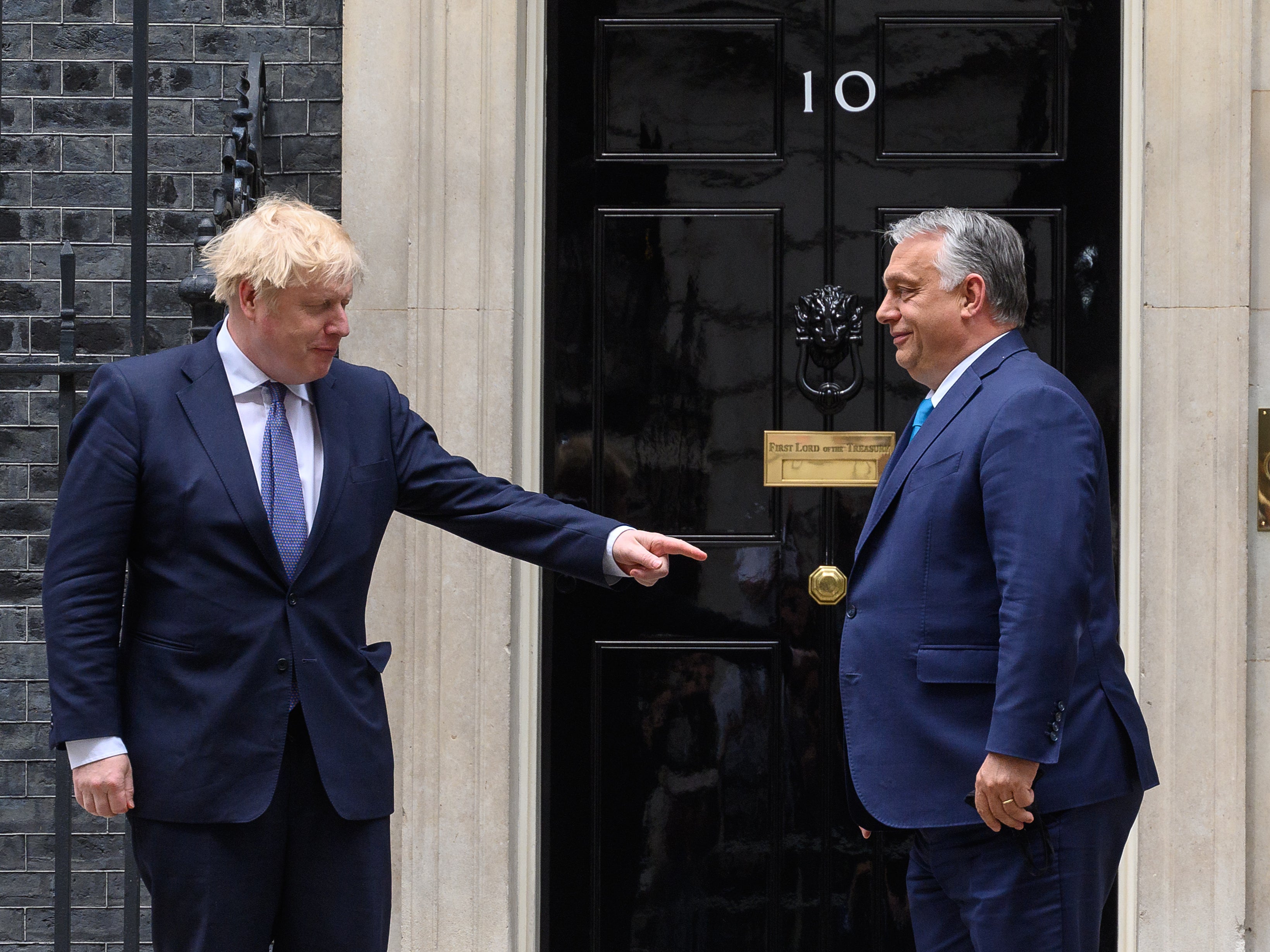What is the point of Boris Johnson’s meeting with Viktor Orban?
The prime minister’s decision to meet with his controversial Hungarian counterpart has not been universally well received. Sean O’Grady considers what Johnson has to gain from it


It would be amusing to suppose that there was a chorus of liberal voices in Budapest objecting to their prime minister, admittedly a bit of a populist himself, collaborating so openly with Boris Johnson – someone who has voiced extremist views on Muslims, is militantly anti-European, and has been responsible for much democratic backsliding in his time in power, in his attempts to suspend parliament and to limit the freedom of the broadcast media and the courts. And yet, so far as can be judged, Viktor Orban’s populist summit with Johnson seems to have attracted, in his home country, little of the outrage that it has ignited in London.
Less amusingly, Orban’s apparent acquiescence, and worse, to an upsurge of antisemitism in Hungary seems to be no barrier to a warm welcome in Downing Street. It is no coincidence that one of the main hate figures for conspiracy theorists is the Hungarian Jewish emigre George Soros. Johnson, who is certainly no antisemite, nonetheless seems happy to pursue his cynical, dangerous liaison with Europe’s second most successful authoritarian – verging on totalitarian – leader (the most successful being Alexander Lukashenko in Belarus).
They are an odd couple, and their meeting makes one wonder who’s using who. Orban is on something of a charm offensive, touring European capitals to make himself look important, a statesman rather than a chancer, ahead of elections next year. Orban will also enjoy annoying the EU’s leadership, which has clashed with him many times over human rights abuses and Hungary’s adamant refusal to take its share of migrants seeking refuge in the EU. Hungary habitually vetoes and weakens EU common foreign policy positions, most recently on Israel and Palestine. His Fidesz party has just been thrown out of the European Conservative/Christian Democrat group in the European parliament, and he is looking for allies against President Macron and Chancellor Merkel, both of whom find Orban difficult to deal with.
Recently Hungary has taken to diluting EU criticism on China, over human rights abuses in Hong Kong, for example – something Johnson will probably have to raise at their meeting. Given the vast industrial and economic advantages Hungary derives from the EU there is no chance that Orban would try and pull his country out of the union; but with allies in the Visegrad group of central European states, especially Poland, he seems very happy to take as much from, and give as little to, the EU as possible. With the British gone, Hungary is the leader of the EU’s awkward squad. Despite setbacks for the likes of Marine le Pen as well as the far right in Sweden, the Netherlands and Germany, the wave of nationalistic protest has not subsided completely.
Orban’s status – as a kind of leader of the opposition to EU integration – is something that commends him to Johnson’s government. While it is too crude to see the UK and Hungary as having a shared interest in weakening the EU, nonetheless the British need allies and friends on the inside to attempt to protect their interests, even if the agent, Hungary, is relatively small and problematic. Hungary can act as friend and “spy in the cab” in European circles, sabotaging measures the British find irksome and generally being a source of intelligence and support on difficult issues such as fishing, financial services and the Irish protocol.
The Hungarians will no doubt appreciate Britain’s reciprocal support from outside the EU, for what it’s worth – and as a NATO partner, especially in relation to Russia. Even so, Hungary’s relations with the Kremlin, soured by a history of occupation and oppression, have become warmer under Orban, who is close to Putin. That, and Hungary’s friendship with China – backed by investment and recruitment into the “belt and road” initiative – will be more tricky for the British to accept (though Johnson personally has declared himself a “Sinophile”).
Before Brexit, a meeting between the British and Hungarian premiers would have been unremarkable, even in the case of Orban. Post-Brexit, and viewed from Brussels, Paris and Berlin, such a summit assumes an entirely different, more sinister, more hostile quality. Orban has also met the Italian opposition leader, the nationalist Matteo Salvini, and the Polish prime minster, Mateusz Morawiecki, who is of a similar ilk, last week. The manoeuvrings continue.
If Orban and Johnson wanted to get some devilment from winding up Ursula von der Leyen, Macron and Merkel, it is safe to assume their handshakes in Downing Street did the trick. Given Orban’s criticism of Joe Biden’s presidency – Trump was Orban’s unofficial guide – it will also go down badly in Washington. Whether anyone’s best interests are served by weakening “Europe”, defined in a wide sense, through such diplomatic games, is another, more momentous question.

Join our commenting forum
Join thought-provoking conversations, follow other Independent readers and see their replies
0Comments